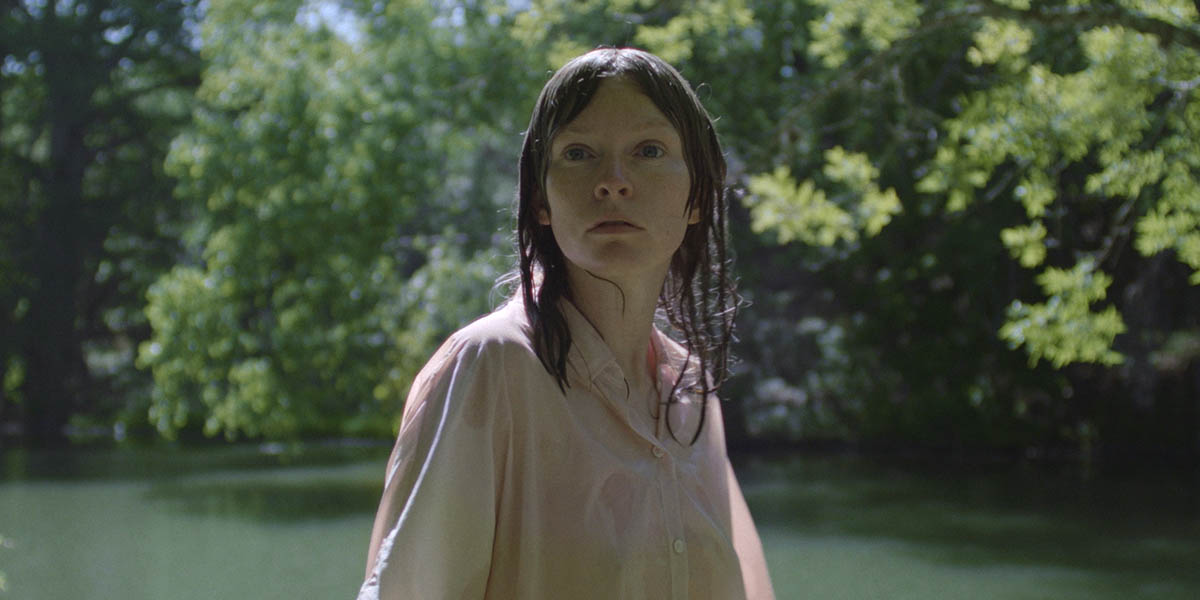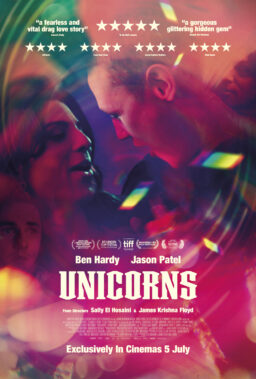At this year’s Chicago International Film Festival, I saw three films from around the globe about people dealing with forces outside their control. In “Family Portrait,” a Texas family gathers for their annual group photo in Spring 2020 just as COVID-19 and the ensuing paranoia begins to spread. In “Club Zero,” an enigmatic nutrition teacher slowly indoctrinates her students with a strict “conscious eating” dogma with disastrous results. Lastly, in “The Bride,” a young Rwandan woman on the verge of attending medical school is kidnapped and forced into marriage with a stranger.
Written and directed by Lucy Kerr, “Family Portrait” takes place on a sprawling estate in Texas as a large family attempts to take their annual group photo for their holiday card. Kerr sets the mood with a lingering, almost silent pan as the family gathers in a field during a more successful previous portrait outing. Slowly, sounds of the wind in the trees, children playing, and the overlapping chatter of the adults fade in, highlighting the chaos that becomes order once the photo is snapped.
Cut to Spring 2020, the family has gathered once again on a sunny morning for their annual portrait. This year, Olek (Chris Galust), the boyfriend of family member Katy (Deragh Campbell), is tasked with taking the photo. The two are eager to leave for the airport, with dialogue indicating that part of their eagerness to depart may stem from the family’s underlying resentment that Olek and Katy are not yet married.
Most of the film unfolds as a series of static shots, like posed photos, as the large family talks about nothing—but says everything about who they are. There are stories about WWII, sick family members, and vaccinations, all of which are done in the most polite tones but are simmering under the surface with the kind of anger that we now know the looming COVID-19 quarantine caused many to boil over. Kerr’s approach at times feels a bit too distant, but if she aims to be as vague as the emotions you can interpret from a still photograph, then she succeeds.

In Jessica Hausner’s deadpan wellness culture satire “Club Zero,” Mia Wasikowska plays Ms. Novak, a pioneer in “conscious eating” who is hired as a nutrition teacher at an elite private school. Ms. Novak charms the headmistress and vulnerable students alike with her fasting tea and steadfast dedication to her kooky eating beliefs.
Ms. Novak’s students have various reasons they want to eat better. There’s a student-athlete, someone hiding her disordered eating, one who thinks eating will help fight climate change, a dancer whose parents work abroad, and a scholarship student who thinks the class will help his test scores. Through this mixture of pupils, the script, which Hausner and Géraldine Bajard co-wrote, navigates the various ways kids can be susceptible to dogma, especially when it’s coming from a trusted source, while at the same time taking an incisive look at the perils of emotional neglect that can happen to the most economically advantaged of people.
Like her earlier films “Amour Fou” and “Lourdes,” Hausner’s film explores fanaticism in many facets. How it can creep into someone’s life slowly. How it can eat away at free will in the name of unwavering belief. With this film, however, she walks the satirical line more successfully, eliciting laughs from the audience during scenes that really should be uncomfortable to watch. That is, until the movie slips completely into a kind of horror, turning on the audience just as subtly as Ms. Novak’s words turned her students, leaving everyone feeling not very well indeed.

Set in the late 1990s in the aftermath of the Rwandan Civil War, as echoes of the genocide by the Hutu militias claimed the lives of countless members of the Tutsi minority ethnic group still linger, Myriam U. Birara’s “The Bride” follows Eva (Sandra Umulisa), a young woman whose future plans include attending medical school. These plans change suddenly when, while out one day collecting avocados, she is kidnapped by a group of men as part of the Guterura rite of enforced marriage.
Shaken from her kidnapping and nightly rape by her new “husband” Silas (Daniel Gaga), Eva collapses into herself. During these harrowing sequences, Birara keeps the camera square focused on Eva’s face as she suppresses tears, trembling as she makes herself as small as possible. She similarly closes herself off when her auntie visits, telling her that she’ll eventually get used to performing her “wifely duties.” Umulisa is devastating in these scenes, allowing the audience to feel every moment of pain along with her.
It’s only in Silas’ unnamed cousin (the extraordinary Aline Amike, who is also fantastic in last year’s “Father's Day,” directed by Kivu Ruhorahoza) that Eva finds any comfort. The two slowly form a bond through preparing her food and other caring acts. The cousin shares how she lost her family in the genocide while Eva survived the war as a refugee in Zaire. Despite their very different pasts, the women find solace in the company of each other. However, just as their closeness develops into something more romantic, the film offers an out for Eva before fully exploring the theme. While the ending still packs an emotional wallop thanks to the wonderfully vulnerable performances from its leads, it does feel a bit rushed, especially since the film clocks in at only 73 minutes. Despite this, the film announces Birara as a director with a strong, clear cinematic vision. I can’t wait to see what she does next.












